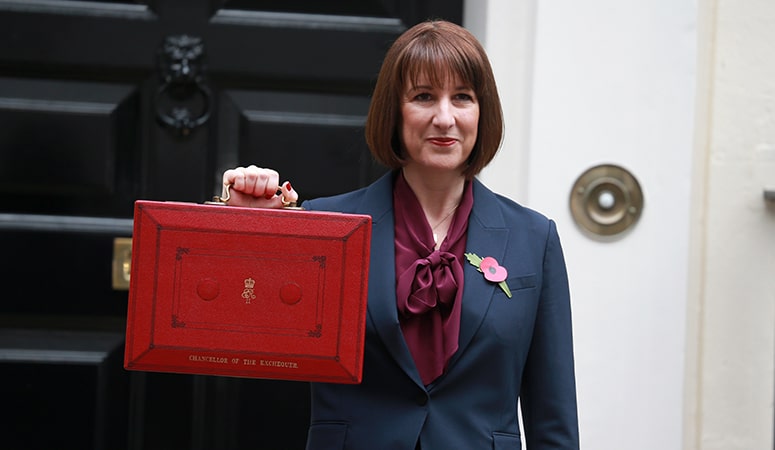Our team provided a webinar detailing the post Budget position and associated planning. If you would like to access this, please register here.
Taking stock of Labour’s first Budget in nearly half a century, (if Tony Blair’s New Labour is categorised as dovish conservatism), we might conclude that Kier Starmer is a chameleon in attempting to be ‘all things to all people’, but in trying to please everybody, may end up pleasing very few.
So, what of a Starmer-led administration? On the one hand, the Budget has been quite cleverly constructed in that it has not overly upset markets – the FTSE was broadly flat but AIM was up c.4%, relieved that the IHT relief wasn’t totally removed. Bond markets have reflected concern and uncertainty about this Government’s borrowing plans, and the situation can perhaps be described as ‘the jury’s out’.
In the immediate aftermath of the general election, the mantra was that this was to be a Labour Government for growth but, we see policies directed at the perceived wealthy and a belief that sustainable growth can be achieved by borrowing to invest in predominantly infrastructure and related building projects.
To facilitate this, the rules on government borrowing were changed to enable the Government to invest c.£100 billion over the next five years. In addition, the UK Infrastructure Bank becomes the National Wealth Fund, with £27.8 billion to ‘catalyse’ private investment – that could make available c.£70 billion.
Improvement in productivity is critical for the UK and sadly we were underwhelmed by initiatives with this focus.
The Office for Budget Responsibility’s review (OBR’s) forecast is for the economy to grow from barely 1% to 2% in 2025. However, it forecasts a decline in GDP growth thereafter! Clearly the OBR sees almost as many negatives as these positives.
The announcement that the Welfare Spending Cap was to be increased by 20% over the course of this parliament (close to £200 billion and approximately double the rate of forecast inflation) leaves no doubt about Labour’s position over welfare – notwithstanding the 9 million people between the ages of 16 and 64 who are not in work.
Providing employment rights from day one of employment, together with the massive increase in employer National Insurance contributions, are very harsh blows for the tens of thousands of small businesses throughout the UK.
Labour has made great play of the ‘black hole’. This is perhaps an unfortunate metaphor because nothing can escape a black hole! Labour’s primary measure is of course the increase to National Insurance contributions, expected to raise £25 billion. Rachel Reeves said it’s right that the burden falls on the broadest of shoulders, so she clearly believes that the tens of thousands of small businesses up and down the country are in robust health with muscular corporate torsos.
The capital gains tax (CGT) increases came as no surprise after so much conjecture, and perhaps relief that it wasn’t worse. But even at the previous rates, there was a reticence to trigger a tax that unlike inheritance tax (IHT) is voluntary in that normally people have freedom to choose whether to sell an asset. These increases will undoubtedly deter some from selling and consequentially reinvesting.
We have long felt that there was a near inevitability of tax being reimposed on pension funds at death, and we would have to say that there is a rationale that there should be some level of clawback. Irrespective of the rights and wrongs, this will have enormous implications, not just for pension planning but for wider estate planning.
The proposal to move investment assets that qualify for Business Relief back into the IHT net from April 2026 – including shares listed on AIM, small businesses, farms and farmland, some green infrastructure, and partially the Enterprise Investment Scheme, is also a further ideological, and for some, a devastating attack. In the big picture, these measures won’t raise that much but will have a severe impact on many business owners and landowners. It’s forecast to raise a miserly c.£500 million by 2030 – less than the cost to fund the NHS for just three days!
It can only have a negative impact on investment in such assets. Most of the working population are employed by companies employing less than 250 people, so NIC increases and IHT are very real body blows to such an important part of the UK economy.
It is also our conjecture that Labour may be holding back, with more surprises focused on inheritance tax. The measures announced in the Budget are likely to trigger more gifting of assets. There is therefore the fear that a future Budget could introduce an extension to the seven-year gifting rule. Early planning therefore will become ever more important.
The UK has become one of the most difficult countries in the world to raise money for early-stage businesses and, without the tax benefits afforded to Venture Capital Trusts (VCTs) and the Enterprise Investment Scheme (EIS), it would be even more difficult. Other than bringing up to 50% of the EIS back into the IHT net, it was a relief that Labour is proactively supporting the existing and very generous tax regime incentivising investment in VCTs and the EIS.
We are living in an era of an explosion of innovation and typically the young companies of today have much greater market opportunity than their counterparts of yesteryear, with sometimes global market opportunity facilitated by the internet.
While both VCTs and the EIS must be regarded as illiquid and high-risk investments, diversification and carefully controlled asset allocation will do much to reduce risk, so we expect to see more interest in what I describe as young private equity.
We see very real challenges for both the economy and our clients. While there is little of concern for investment planning as markets are essentially global, the attack on pensions in particular will, we believe, trigger a fundamental shift in a number of areas of financial planning.
Our clients have always looked to us for peace of mind, reassurance and expert planning – please contact your consultant to talk through any concerns you may have as we navigate together this Government’s first Budget.






